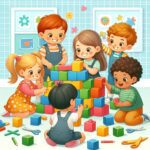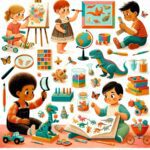Developing a growth mindset in early childhood is akin to planting a seed that grows into a resilient, flourishing tree. It’s about nurturing an attitude in children that challenges are just opportunities for growth and that effort leads to success. This foundational belief influences how they approach learning and life’s obstacles, setting the stage for a lifetime of curiosity, perseverance, and personal development.
Understanding the Growth Mindset in Early Childhood
A growth mindset, a term popularized by psychologist Carol Dweck, suggests that abilities and intelligence can be developed through dedication and hard work. In early childhood, this mindset encourages children to embrace challenges, persist in the face of setbacks, learn from criticism, and find lessons and inspiration in the success of others.
Developing a growth mindset in early childhood is not just about praising effort over results. It’s about communicating the value of the process and making sure children understand that mistakes are not failures but part of the learning journey. This perspective helps build resilience, a critical component in the emotional and intellectual development of young minds.
Strategies for Developing a Growth Mindset in Early Childhood
Encouraging a growth mindset in children involves more than just changing the way we speak to them; it requires a shift in our approach to parenting and education. Here are some effective strategies:
1. Praise the process: Focus on the effort, strategy, and determination rather than the outcome. Celebrate the hard work and persistence that went into completing a task.
2. Embrace challenges: Teach children to see challenges as opportunities for growth. Encourage them to take on tasks that stretch their abilities and help them learn new skills.
3. Model a growth mindset: Children learn by example. Show them how you face your own challenges, learn from mistakes, and persevere through difficulties.
4. Use growth mindset language: Incorporate phrases that promote a growth mindset into daily conversations. Sayings like “You can learn to do anything you want,” or “Mistakes help you improve,” can be powerful motivators.
5. Teach the value of criticism: Help children understand that constructive criticism is a gift. It provides them with specific information on how to improve.
6. Encourage self-reflection: Make it a habit to reflect on the day’s learning and challenges. Ask questions like, “What did you learn today?” and “What would you do differently next time?”
For more strategies on nurturing your child’s emotional and intellectual growth, consider reading our detailed guide on developing a growth mindset in early childhood.
The Impact of a Growth Mindset on Learning and Development
Developing a growth mindset in early childhood has profound implications for a child’s learning and development. It fosters a love for learning, encourages resilience in the face of failure, and promotes greater creativity and innovation. Studies have shown that children with a growth mindset are more likely to embrace challenges, persevere through difficulties, and achieve higher levels of success.
Furthermore, a growth mindset helps children develop a healthier relationship with failure. It transforms their perception of failure from a negative outcome to a stepping stone towards improvement and mastery. This shift in perspective reduces anxiety and fear of failure, enabling children to engage more deeply with their learning experiences and explore their full potential.
Incorporating elements from our visual tracking activities for infants, games to enhance memory and concentration in toddlers, and nutrition and its effect on toddler behavior and development can further support a growth mindset by fostering cognitive skills and physical well-being, which are crucial for a child’s overall development.
By understanding and implementing the principles of developing a growth mindset in early childhood, parents and educators can lay the foundation for a lifetime of learning, resilience, and success. Remember, the goal is not just to prepare children for school, but for life. With the right mindset, every challenge becomes an opportunity to grow, learn, and evolve.













